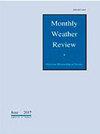从厄尔尼诺/南方涛动角度看 TRMM LIS 数据集中的年际闪电变异性
IF 2.8
3区 地球科学
Q3 METEOROLOGY & ATMOSPHERIC SCIENCES
引用次数: 0
摘要
利用热带降雨测量使命(TRMM)闪电成像传感器(LIS)研究了 1998-2014 年南纬 38 度-北纬 38 度范围内闪电的年际变化。以往的研究表明,厄尔尼诺/南方涛动(ENSO)现象是造成雷电年际变化的一个重要因素,可能是全球范围内的主要机制。根据海洋尼诺指数,在这 16 年中,厄尔尼诺/南方涛动现象有 4 个暖年(厄尔尼诺)、8 个冷年(拉尼娜)和 4 个中性年。在厄尔尼诺/南方涛动的暖期发现了大范围的闪电异常,非洲中北部和阿根廷的暖期平均异常大于 10 Fl (1000 km)-2 min-1。其中包括 2009 年厄尔尼诺现象期间阿根廷出现的 +35 Fl (1000 km)-2 min-1 异常。总体而言,热力学特性和高层大气垂直运动的大尺度异常与在非洲和南美洲观测到的闪电异常相吻合。然而,非洲中北部的异常特点是年度闪电最大值随温暖阶段变化了 6 周,这是萨赫勒地区对厄尔尼诺/南方涛动的环境反应更为复杂的结果。在非洲东南部、巴西西北部、墨西哥中部和红海南部发现的厄尔尼诺/南方涛动异常与明显的闪电现象最为一致。其中,除墨西哥地区外,其他地区的雷电在寒冷阶段都有所增强,而在温暖阶段则有所减弱。本文章由计算机程序翻译,如有差异,请以英文原文为准。
Inter-Annual Lightning Variability within the TRMM LIS Dataset Using an ENSO Perspective
The Tropical Rainfall Measuring Mission (TRMM) Lightning Imaging Sensor (LIS) was used to investigate inter-annual variability of lightning from 1998-2014 within the 38° S – 38° N range. Previous studies have indicated that the El-Niño/Southern Oscillation (ENSO) phenomenon is one significant contributor to inter-annual lightning variability, potentially the dominant mechanism on the global scale. This period of 16 years contained 4 warm- (El Niño), 8 cold- (La Niña), and 4 neutral-phase ENSO years based on the Oceanic Niño Index. Large magnitude lightning anomalies were found during the warm phase of ENSO, with mean warm-phase anomalies of > 10 Fl (1000 km)−2 min−1 in north-central Africa and Argentina. This includes a +35 Fl (1000 km)−2 min−1 anomaly in Argentina during the 2009 El Niño. In general, large-scale anomalies of thermodynamic properties and upper atmospheric vertical motion coincided with the lightning anomalies observed in both Africa and South America. The anomaly over north-central Africa however was characterized by a 6-week shift in the annual lightning maximum with the warm phase, a result of the more complex environmental response to ENSO over the Sahel. The most consistent ENSO anomalies with appreciable lightning were found in southeastern Africa, northwestern Brazil, central Mexico, and the southern Red Sea. Of these, all but the Mexico region had enhanced lightning with the cold phase and suppressed lightning with the warm phase.
求助全文
通过发布文献求助,成功后即可免费获取论文全文。
去求助
来源期刊

Monthly Weather Review
地学-气象与大气科学
CiteScore
6.40
自引率
12.50%
发文量
186
审稿时长
3-6 weeks
期刊介绍:
Monthly Weather Review (MWR) (ISSN: 0027-0644; eISSN: 1520-0493) publishes research relevant to the analysis and prediction of observed atmospheric circulations and physics, including technique development, data assimilation, model validation, and relevant case studies. This research includes numerical and data assimilation techniques that apply to the atmosphere and/or ocean environments. MWR also addresses phenomena having seasonal and subseasonal time scales.
 求助内容:
求助内容: 应助结果提醒方式:
应助结果提醒方式:


